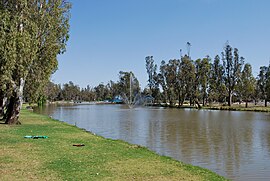Cohuna, Victoria
|
Cohuna Victoria |
|
|---|---|

Gunbower Creek
|
|
| Coordinates | 35°48′0″S 144°12′0″E / 35.80000°S 144.20000°ECoordinates: 35°48′0″S 144°12′0″E / 35.80000°S 144.20000°E |
| Population | 2,313 (2011 census) |
| Postcode(s) | 3568 |
| Location | |
| LGA(s) | Shire of Gannawarra |
| State electorate(s) | Murray Plains |
| Federal Division(s) | Mallee |
Cohuna /koʊˈhuːnə/ is a town situated 274 kilometres (170 mi) north of Melbourne, on the Murray Valley Highway, in northern Victoria, Australia. At the 2011 census, Cohuna had a population of 2,313.
A Post Office opened in the area on 18 September 1875, known as Mologa until 1876, then Cohuna and renamed Cullen in 1884 when Cohuna Township PO opened. This latter office was renamed Cohuna around 1887.
Surrounded by dairy farms, and situated on the banks of Gunbower Creek, (an anabranch of the Murray River), the town is a popular holiday spot as well as a regional sports centre with a wide range of facilities.
Cohuna is the main access point to the attractions of the vast red gum and box forest covered Gunbower Island, which lies between Gunbower Creek and the Murray, and is home to diverse native birdlife, kangaroos and emus.
Legend has it that John Farnham was "discovered" in Cohuna, and he returned in 2002 for a free one-off show. The Bee Gees also played in Cohuna in their early days.
More recently, Australian artist Sarah Blasko used Cohuna landmarks such as a local cafe and hospital for her video "Planet New Year".
Gunbower Creek runs along the main street and garden park. Golf, tennis, camping, fishing, water-skiing, canoeing, birdwatching and bushwalking are popular with visitors.
The Cohuna water tower is adorned with the town's name, and visible for kilometres.
...
Wikipedia

